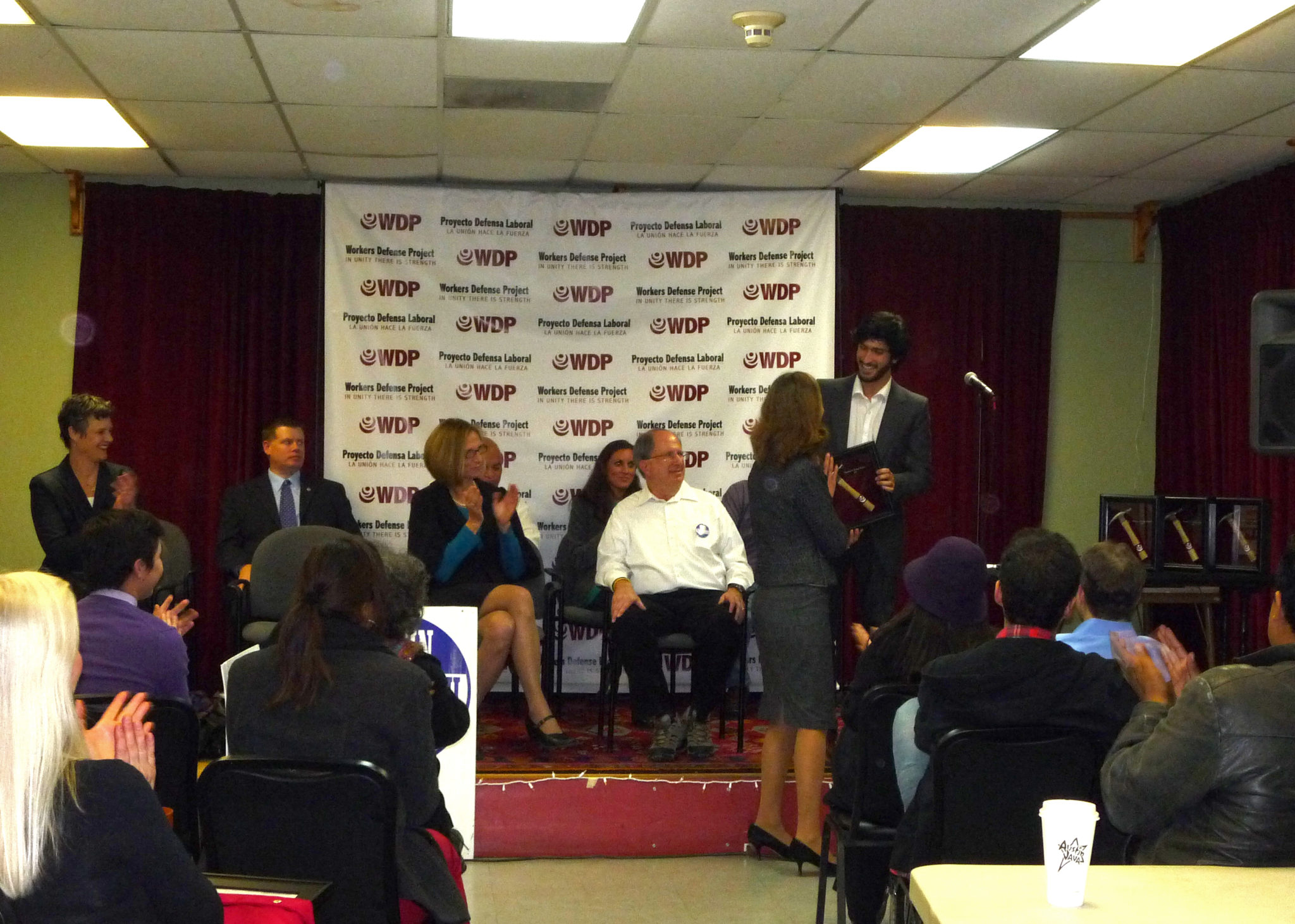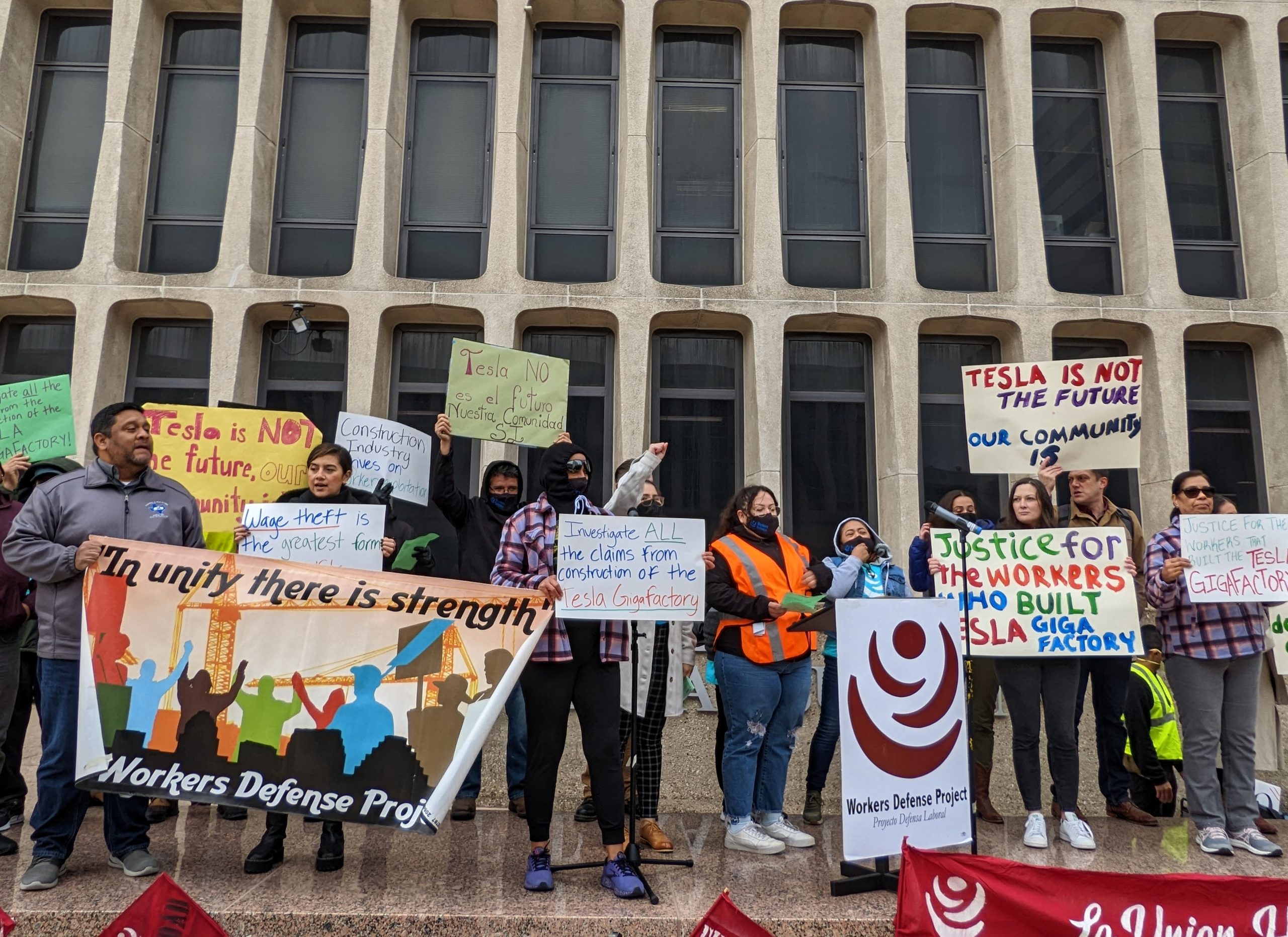
Workers’ Group Honors Austin-Area Officials for Supporting Living Wage

In a small celebration at the Workers Defense Project office on Tuesday, the labor advocacy group presented awards—wooden lightboxes with small hammers inside—to Austin and Travis County officials who have helped institute a living wage floor for certain workers.
After years of advocating fair compensation, labor leaders saw a victory last month when the Travis County Commissioner’s Court approved a requirement that all companies receiving county tax incentives pay workers at least $11 per hour—$3.75 more than the federal minimum wage. A special subcommittee of the Austin City Council made a similar recommendation last month. Members who voted for the wage floor were honored at Tuesday’s ceremony.
Travis County Commissioner Sarah Eckhardt was the first to receive an award—handcrafted by Workers Defense employees and members—for leading Travis County’s implementation of the wage floor. Next were Austin City Council members Kathie Tovo, Laura Morrison and Mike Martinez.
Labor leaders, including Workers Defense and Austin Interfaith, have been trying to get a living wage floor passed in Austin for years. Progress had been slow as critics argued that requiring companies to pay workers more would stifle economic growth.
“My response to that is: unfortunately this policy only applies to a miniscule number of construction projects within this county,” Eckhardt said. “And the idea that we would not be competitive by applying an absolutely justifiable—and frankly too low—wage floor to some of the most dangerous work in Travis County is a fairly outrageous position.”
The county agreed to tie the wage floor to the minimum wage for county employees, which is $11 per hour. The City of Austin uses the same standard. Greg Casar of Workers Defense said advocates originally wanted a $12-an-hour minimum, but it made sense to tie the construction wage floor to the county and city’s, so the pay floor can rise automatically with inflation. For now, the wage floor only applies to construction jobs (including contract work) for projects with local tax incentives, and the county doesn’t give nearly as much money in tax incentives as the city does, not to mention the state.
Texas leads the country in economic incentives given to new companies, with about $19.1 billion, or 51 cents per dollar of the state budget, going toward incentive programs each year, according to a New York Times investigation. (That figure is disputed.) Gov. Rick Perry has encouraged local incentives to recruit companies into Texas to help drive the state’s economic growth. But in 2011, Texas ranked 10th in terms of percentage of people living in poverty, according to U.S. Census data and the American Community Survey.
Workers Defense Project Executive Director Cristina Tzintzún says many of the jobs brought to the state are minimum wage and leave breadwinners ill equipped to support their families.
“We know Austin is one of the fastest-growing cities in the country and with that growth comes additional responsibilities and also opportunities,” Tzintzún said. “The city has had a unique opportunity to ensure shared prosperity and equal protection for those who are building our growing city.”
Tzintzún said Texas is the most deadly place for construction workers in the country, referencing a 2010 report that found a construction worker dies every two and a half days in the state. She also said nearly half the construction workforce in Texas lives below the poverty line, citing a study the organization plans to release in early 2013. In highly unionized states like New York, California, Illinois and Ohio, she said, construction jobs can support middle-class families.
Several developers and tech companies that have come to Austin have already agreed to some kind of wage floor and/or other terms presented by Workers Defense. Workers Defense Project and their supporters lobbied the City Council to require HID Global, Trammell Crow Co. and Apple to institute wage floors for construction workers, guarantee safe working conditions and commit to hiring a percentage of disadvantaged Austin residents graduating from construction training programs. Apple agreed to a $12 per hour wage floor for workers building its 38-acre campus in north Austin, and Visa recently volunteered an $11 per hour wage floor for all jobs tied to its center, including those needed to refit the building it will occupy. Workers Defense is still negotiating with HID Global.
Opponents, including the Austin Chamber of Commerce, have said they will continue to fight the wage floor. Austin Mayor Lee Leffingwell also opposes it and was the lone dissenter in the subcommittee recommendation to institute a wage floor at the city level for projects receiving incentives, arguing it will drive companies away from Austin. The subcommittee’s recommendation will go before the City Council next month.


